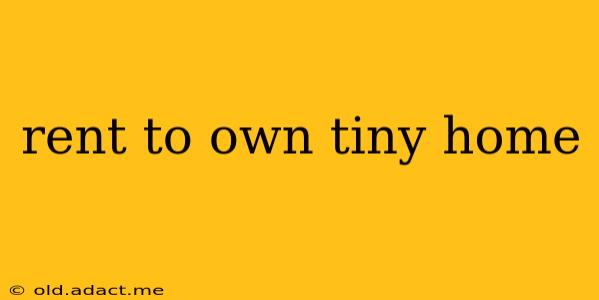The tiny home movement continues to gain momentum, offering an attractive alternative to traditional housing. For many, the dream of owning a tiny home is tempered by the financial hurdles of upfront costs. This is where rent-to-own (RTO) options emerge as a potentially viable solution. But what exactly does rent-to-own mean in the context of tiny homes? And is it the right choice for you? Let's delve into the details.
What is a Rent-to-Own Tiny Home?
A rent-to-own tiny home agreement typically involves paying monthly rent, with a portion of that rent going towards the eventual purchase price of the home. It's a form of financing that allows you to gradually build equity while living in your tiny home. Crucially, the specifics of the agreement, including the length of the rental period, the amount applied towards the purchase price, and the final purchase price, will vary significantly depending on the seller and the individual contract.
How Does a Rent-to-Own Tiny Home Agreement Work?
The process usually involves negotiating a contract with a seller. This contract will clearly outline:
- Monthly Rent: This payment covers the use of the tiny home.
- Equity Buildup: A specified portion of each monthly payment is allocated towards the purchase price of the tiny home.
- Rental Period: The agreed-upon timeframe before you can exercise the option to purchase the home.
- Purchase Price: The final amount you'll pay to fully own the tiny home.
- Terms of Purchase: Details about how the final purchase will be made (e.g., cash, financing).
It's vital to thoroughly review the contract with legal counsel before signing. Unlike traditional mortgages, rent-to-own agreements aren't always subject to the same regulatory protections.
What are the Advantages of Rent-to-Own Tiny Homes?
- Lower Upfront Costs: This is a primary draw for many. RTO eliminates or significantly reduces the need for a large down payment, making homeownership more accessible.
- Opportunity to Test the Lifestyle: Living in a tiny home is a significant lifestyle change. Renting first allows you to experience the advantages and challenges before fully committing to ownership.
- Gradual Equity Building: Each rent payment contributes to your eventual homeownership, making it less of a daunting financial leap.
- Improved Credit: Consistent on-time rent payments can positively impact your credit score, benefiting you if you seek traditional financing later.
What are the Disadvantages of Rent-to-Own Tiny Homes?
- Higher Overall Cost: While upfront costs are lower, the total amount paid over the rental period might exceed the market value of the tiny home. This is a common criticism of RTO arrangements.
- Limited Flexibility: You're locked into a contract for a specific period. Breaking the contract early can result in financial penalties.
- Risk of Losing Investment: If you fail to meet the terms of the agreement, you could lose all the money you've paid towards the purchase price.
- Lack of Regulatory Protection: Unlike traditional mortgages, RTO agreements often have fewer consumer protections.
Is a Rent-to-Own Tiny Home Right for Me?
Determining whether a rent-to-own tiny home is the right choice requires careful consideration of your individual financial situation and lifestyle goals. Assess your comfort level with the potential risks, and make sure to thoroughly research potential sellers and agreements. Seek professional financial and legal advice before committing.
Where Can I Find Rent-to-Own Tiny Homes?
Finding rent-to-own tiny homes may require more legwork than finding traditional rental properties. Start by checking online marketplaces and contacting tiny home builders and sellers directly. Networking within the tiny home community can also prove beneficial. Be aware of scams and thoroughly vet any opportunities before making a commitment.
What are the Legal Aspects of Rent-to-Own Tiny Homes?
Rent-to-own agreements are legally binding contracts. It's crucial to have the contract reviewed by a lawyer specializing in real estate to ensure you fully understand the terms and your rights. The specific legal implications vary depending on your location. Consult with a legal professional in your area to understand local regulations.
What are the Financing Options for Buying a Tiny Home After Renting?
Even after successfully completing a rent-to-own agreement, you might still need financing for the final purchase. Explore traditional mortgage options, personal loans, or other financing avenues to secure the funds to complete the purchase.
How Can I Avoid Scams When Renting to Own a Tiny Home?
Always thoroughly research the seller and the agreement. Be wary of deals that seem too good to be true. Never sign a contract without understanding its terms completely. Consult with legal and financial professionals before making any commitments.
By carefully considering these aspects and doing your due diligence, you can navigate the rent-to-own tiny home market effectively and make an informed decision that best suits your needs and circumstances. Remember, thorough research and professional advice are invaluable in this process.
